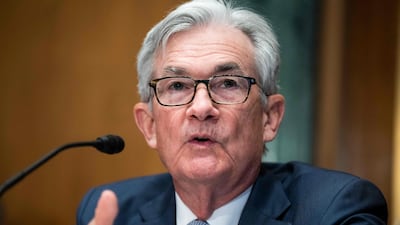The US central bank is prepared to raise interest rates by bigger steps than the quarter-point increase announced last week if needed to contain “much too high” inflation, Federal Reserve Chairman Jerome Powell said on Monday.
Consumer prices in the world's largest economy have surged to the highest seen in four decades, and the Fed last week raised the benchmark lending rate for the first time since the Covid-19 pandemic began to try to tamp down inflation pressures.
“If we conclude that it is appropriate to move more aggressively by raising the federal funds rate by more than 25 basis points at a meeting or meetings, we will do so,” he said in a speech to an economics conference.
Inflation was already rising before the Russian invasion of Ukraine added to new price pressures and supply chain impediments that could spill over into the US economy, he told the National Association for Business Economics.
“There is an obvious need to move expeditiously” to remove the stimulus the Fed provided to the US economy during the pandemic, but Mr Powell said central bankers are prepared to go beyond “neutral” and tighten policy if needed to achieve their goal.
Last week's rate increase was billed as the first in a series and several policymakers have expressed willingness — or the need — to move in bigger steps.
“We are committed to restoring price stability while preserving a strong labour market,” Mr Powell said.
He was optimistic the Fed could achieve that without tipping the US economy into a recession, an elusive goal known as a “soft landing”.
Even with the oil price shock sparked by the conflict in Ukraine, he noted that “today the economy is very strong and is well positioned to handle tighter monetary policy".
But he cautioned that “very little is straightforward in the current context” and there is high uncertainty about the impact of the war.

